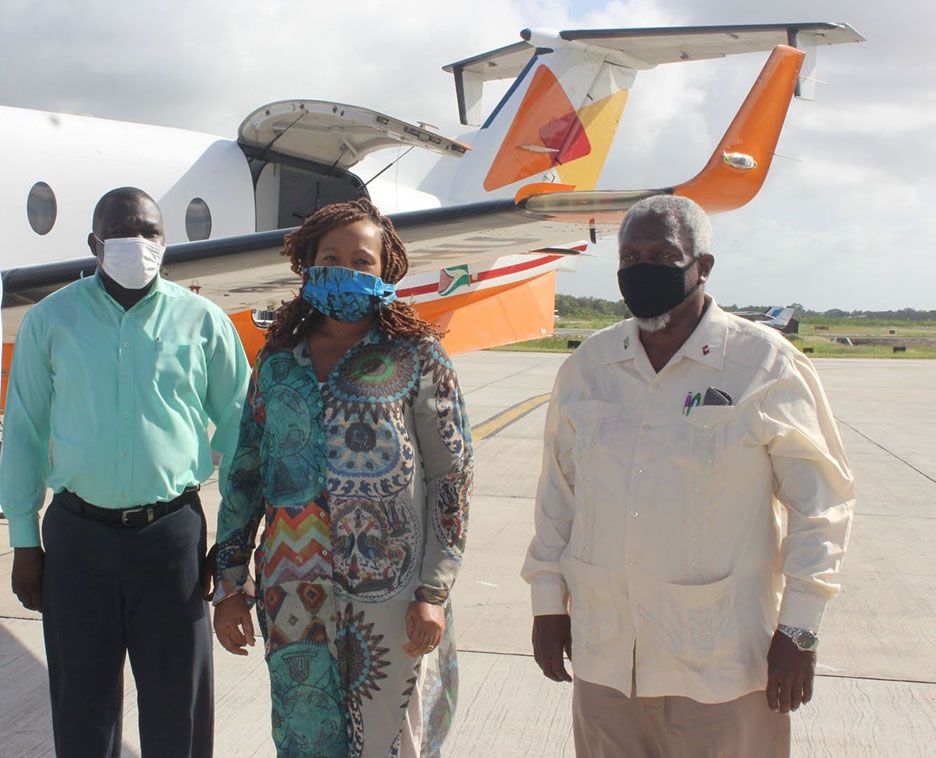In a blistering report the three-person scrutinizing team from CARICOM declared that the National Recount of votes and by extension the March 2, 2020 general and regional elections were sufficiently transparent to reflect the will of the Guyanese people and form the basis for the declaration of the results.
“The people of Guyana expressed their will at the ballot box and as a result the CARICOM observer team concludes that the recount results are completely acceptable,” they concluded in their report submitted to GECOM yesterday.
This conclusion stands in direct contrast to the report submitted on Saturday to the Guyana Elections Commission (GECOM) by Chief Election Officer (CEO) Keith Lowenfield in which he suggested that approximately 60% of the 460,295 votes cast on March 2 could not be validated.
“Consequently, on the basis of the votes counted and the information furnished from the recount, it cannot be ascertained that the results… meet the standard of fair and credible elections,” the CEO concluded in each summary of the observation reports for every District.
The CARICOM team which was led by Cynthia Barrow-Giles, Senior Lecturer in the Department of Government at the University of the West Indies (UWI), however took a different position.
Though they took note of the anomalies and irregularities identified by the incumbent APNU+AFC coalition, the team repeatedly stressed in their report that they did not witness anything which would render the recount and by extension the casting of the ballot on March 02, “so grievously deficient procedurally or technically, or sufficiently deficient to have thwarted the will of the people.”
In fact they argued that the “public utterances of some GECOM commissioners, political pundits and politicians may have sounded an ominous tone for the 2020 Elections with the partisan driven and distorted narrative on migrant voting, phantom voting and implied voter impersonation.”
In explaining their methodology the team noted that they were able to observe the recount of 423 or 18% of the 2,339 boxes.
Initially one member had been assigned to a single station for an entire day but by the end of the week a decision was taken to deploy members to as many of the 10 stations as possible with each member being assigned different regions to discern general problems across the spectrum of the 10 regions.
They repeatedly noted that no evidence of these contentions were produced and identified a sample of 36 ballot boxes where a total 2,048 queries were made. Of that number a mere 156 or 7.6% of the queried electors were found to have cast a ballot.
“The team views much of the exercise as a fishing expedition…which resulted in considerable time being wasted during the recount,” they stated adding that the incumbent cast their net wide in the hope of at least making a small catch.
Stressing that in their view the objections raised by the Coalition were not materially relevant, the team indicated that “many issues which emerged…were done primarily with the political objective of preparing the ground work for a post recount legal challenge.”
Bizarre
“The numerous requests for information on serial numbers were so bizarre that on one observed occasion an APNU/AFC agent was prepared to query serial numbers on the OLE at a station where no one voted,” they indicated. They also note that there was no way of knowing who benefitted from these “phantom votes”.
The team indicated that in cases where there were minor issues it was not viewed as sinister. One such minor issue was the case of unstamped ballots.
While it was noted that Presiding Officers who failed to properly stamp ballots caused legitimately cast ballots to be rejected the team stressed that this did not take place on a massive scale.
Particularly in the case of ballots cast by members of the disciplined services the team noted that at intermixing stations across eight regions a grand total of nine ballots were rejected for want of official mark. Information for Regions Four and 10 were unavailable.
“Nothing we saw up to the closing day of the recount suggested that the poll workers on March 2 conducted themselves in a manner which would indicate illegality or a deliberate intent to benefit a particular list of candidates over another,” they said.
The team however acknowledged that the objections revealed a padded list which GECOM should immediately address. They also drew attention to the 29 boxes from the East Coast of Demerara which were missing statutory documents particularly the counterfoils for ballots and the Official List of Electors.
The absence of these documents has been used by the incumbent to attempt to invalidate in excess of 7,000 votes. The CARICOM team has recommended that an investigation be conducted into this situation but stated that in their view the absence of the documents was not fatal to the recount.
An additional observation of a number of instances of broken or missing ballot box seals was not considered impactful since the “contents did not show signs of having been breached or violated.”
The Observation Reports in which the queries and irregularities were recorded were described as a colossal error which facilitated delay in ensuring the recount could be completed within the stipulated timeframe.
Elaborate checklist
Also criticized was the decision to insist on an elaborate checklist for the recount. This checklist described as a “bad decision” contributed to the lengthy and unreasonable time to recount the ballots.
In fact between the checklist and the queries facilitated, the team concluded that “delay was built into the system.”
They specifically noted that for the first two weeks the recount was slow because of an elaborate reconciliation process and abuse of the system by some of the party agents with requests for non-relevant and non-pertinent information including the vexatious demand for the poll book to ascertain the reason for five spoilt ballots.
Also noted was “obvious intimidation and trepidation of the staff in the face of extreme pressure from party agents.”
Specific mention was made of many instances of “blatant incivility” on the part of APNU+AFC agents particularly in Region 4 workstations.
“Often these emotional outburst, loud shouts, arrogance, aggressive and dismissive attitude descended into shouts of ‘shut up’ and on one occasion to personal insults and invectives,” the report states.
In fact for 62 pages the team took aim at members of the Commission, the secretariat and political party agents each of whom they identified as frustrating the process at different stages.
Specifically the Commission was called to task for the Gazetted Order which the team noted made the process an audit rather than a recount.
They argued that given the contours and elaborate process which was outlined by the Order and the work plan issued by the secretariat it remains unclear how the Commission actually perceives a recount.
“The exercise that we observed…was an audit of the votes cast. From the start is was conceived as an audit notwithstanding statements about a National Recount,” they stressed adding that the Order established a convoluted process for the final declaration of the results of the election which required submission of reports and resubmission of reports as well as deliberations of the Commission before a final declaration could be made.
Decisions made around the observations report were also criticized for facilitating the false narrative of a fraudulent elections.
The team noted that the audio broadcast in the work stations and the decision to read the observation reports during the daily tabulation provided fodder for persons who peddled the incumbent’s queries as factual.
GECOM they argued allowed itself to be manipulated into making decisions which facilitated the promulgation of this narrative which “perhaps was precisely the political objective”.
The other members of the team were Sylvester King, Deputy Supervisor of Elections of St. Vincent and the Grenadines and John Jarvis, Commissioner of the Antigua and Barbuda Electoral Commission.





